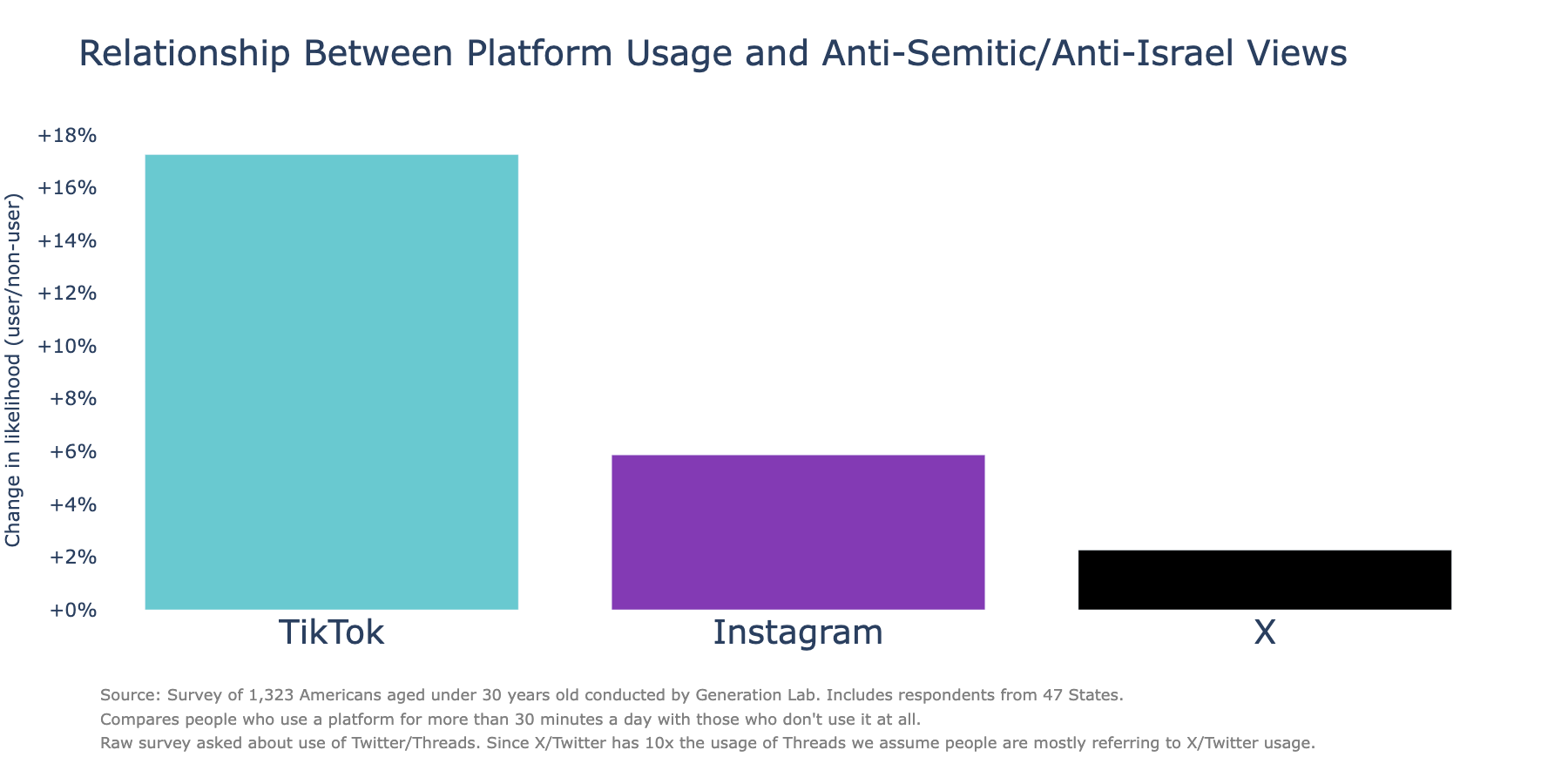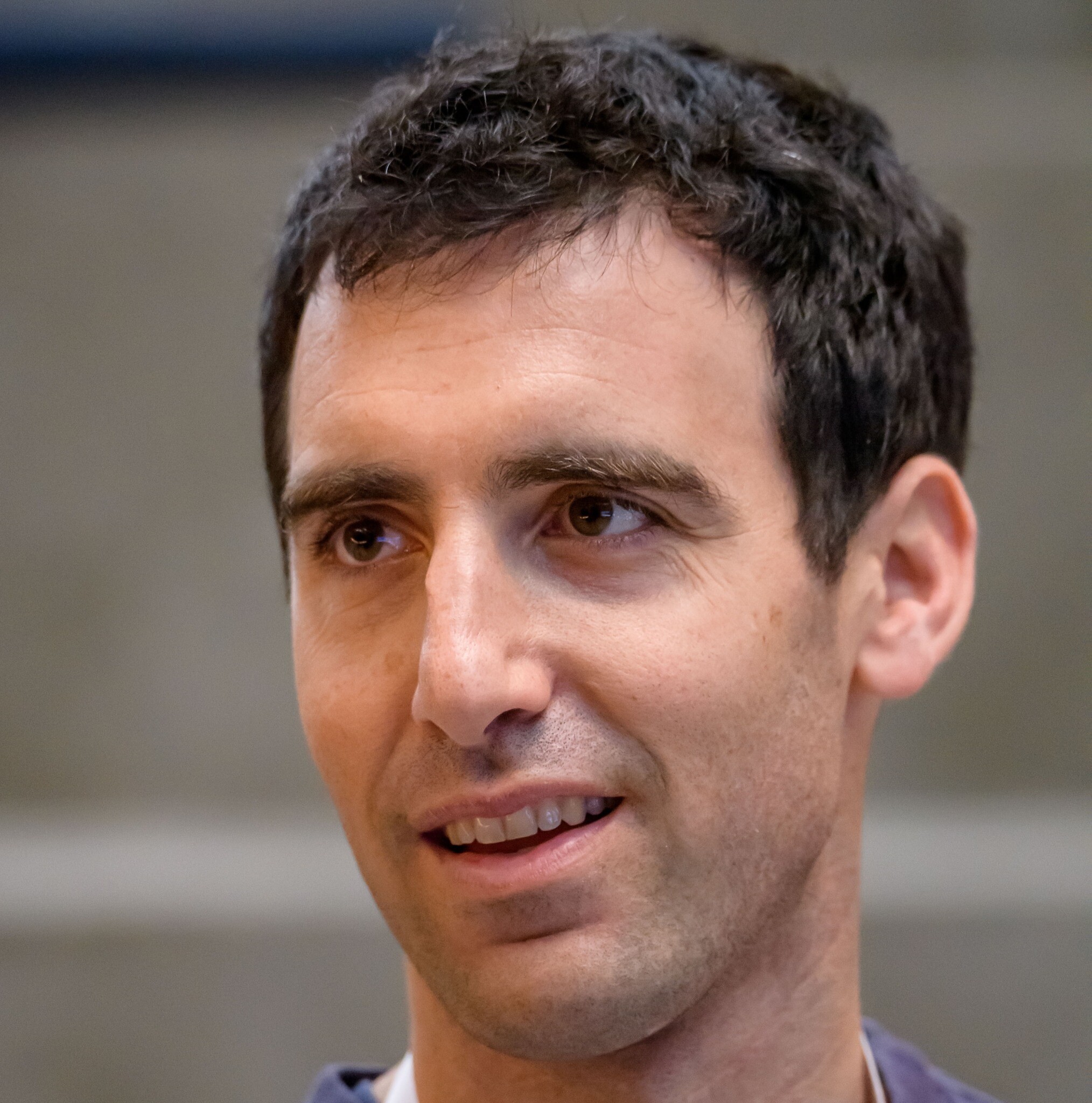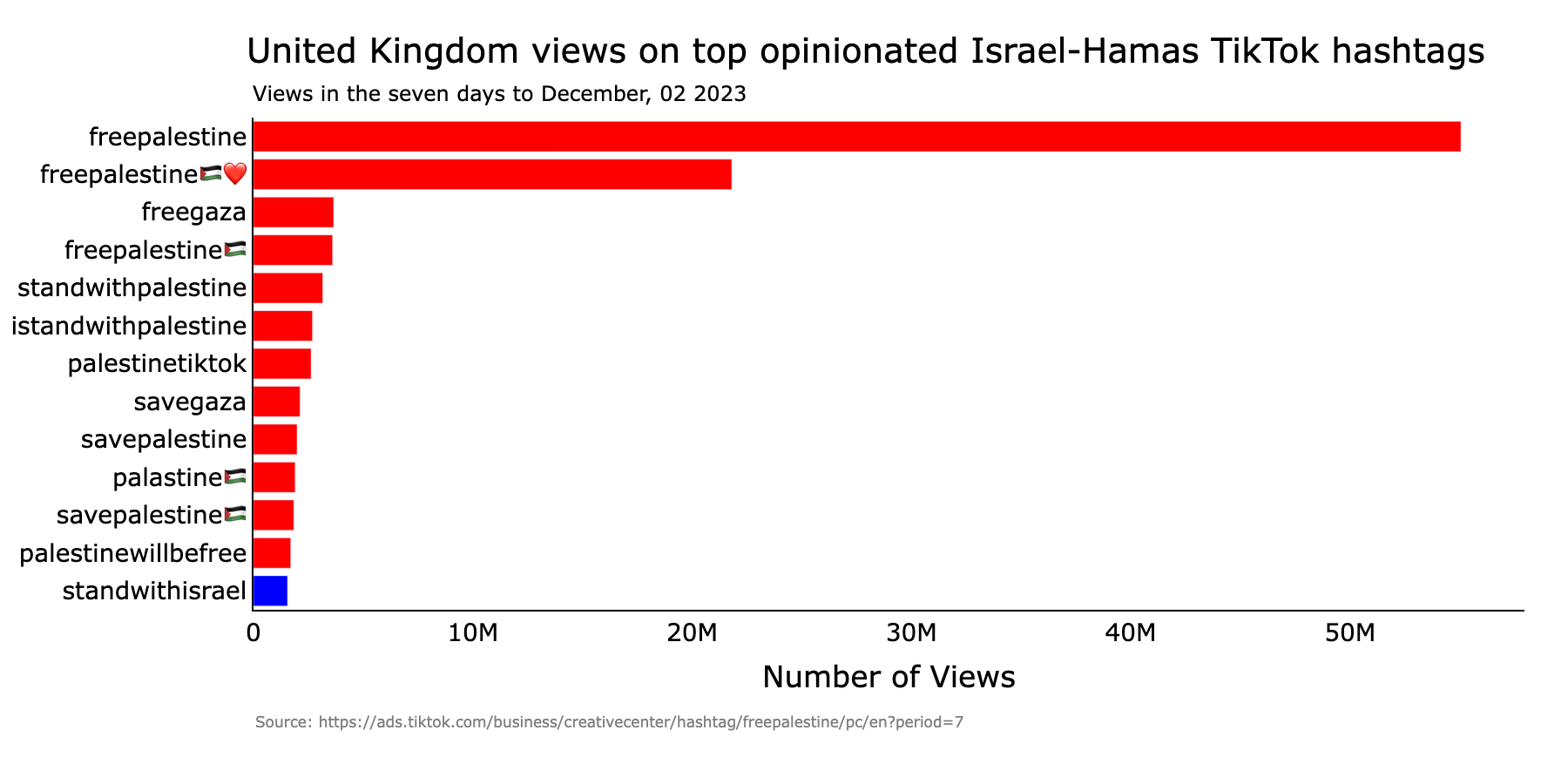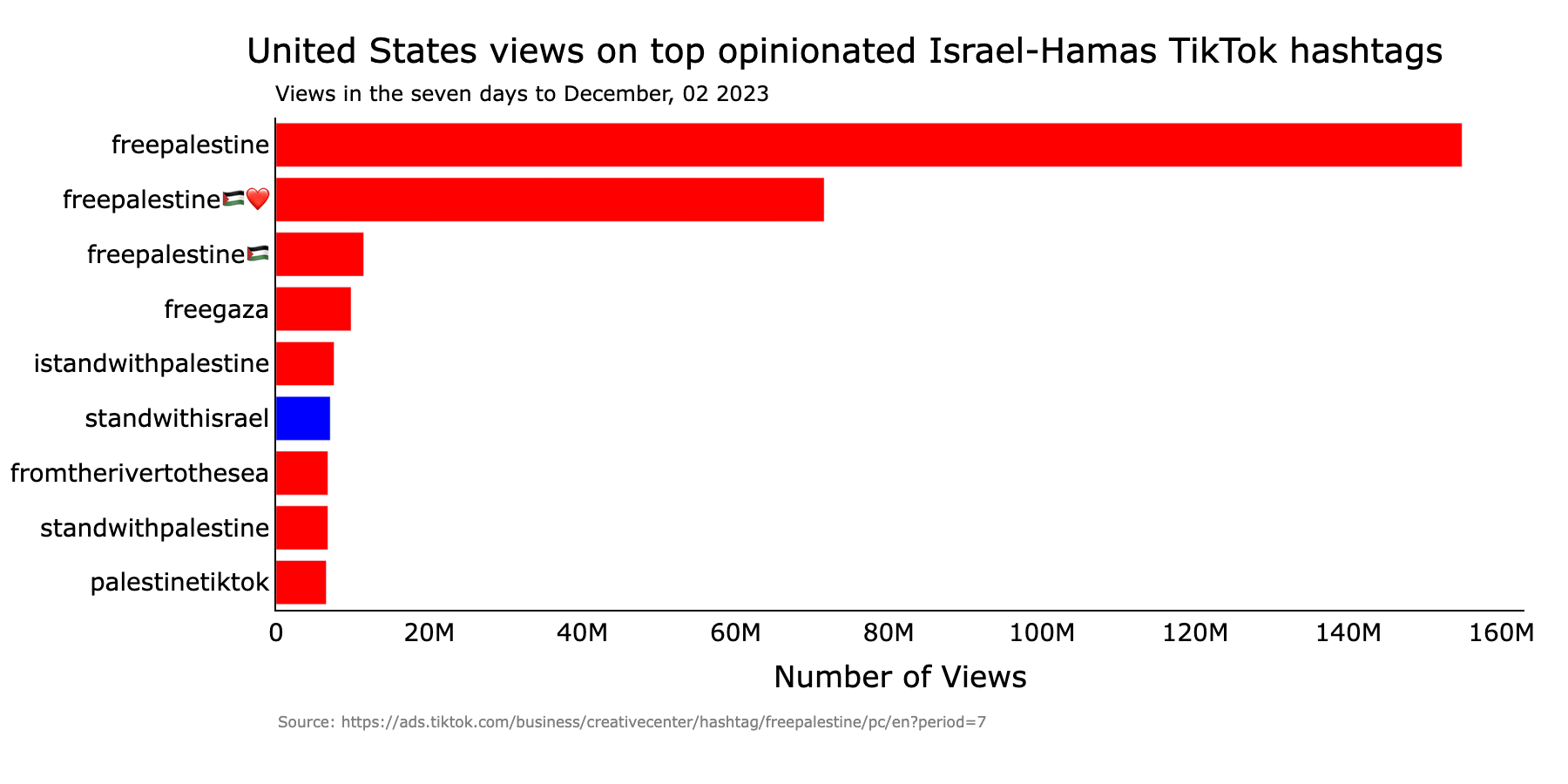TikTok ‘fuels antisemitism’, despite telling JN it’s deleted 12m hate videos since 7 October
Survey links social media platform to a surge in anti-Israel bias among young people as Pro Palestinian content appears to dominate the narrative
TikTok users who spend just 30 minutes a day on the site increase their chance of holding “antisemitic or anti-Israel” views, compared with other social media platforms, a survey shows.
According to the US-based survey, this likelihood increased by 17 percent, compared with six percent on Instagram and X’s two percent.
The report was carried out by Anthony Goldbloom, the founder of data science company Kaggle, which was acquired by Google in 2017, alongside other tech individuals. It suggests that TikTok – which has over one billion monthly users – is shaping anti-Israel views among 18-to-29 year olds.
Goldbloom, who published the findings on X last week, said: “TikTok users are more likely to believe Jewish people are dishonest in business, are disloyal to America, and have too much power in the media. They are also more likely to disagree that Israel has a right to defend itself against those who want to destroy it.


“This is not surprising when you consider that for every view of a TikTok video with a pro-Israel hashtag in the US, there are 54 views of videos with pro-Palestinian hashtags,” said Goldbloom. “In fact, FreePalestine is currently one of the top-performing hashtags across all of TikTok.” This is even the case in Israel when it comes to hashtags on the Israel-Gaza conflict, noted Goldbloom.
While the survey was carried out on over 1,323 Americans aged 18 to 29, Goldbloom said that data from the UK shows a similar pattern.


These ratios differ from opinion polls, which show sentiment among Americans aged 18-24 split roughly equally between Israel and the Palestinians. “TikTok does not merely reflect pre-existing sentiment—it is shaping views, creating a dangerous environment for Jews,” warned Goldbloom.
“All of this matters, TikTok has tremendous reach. It’s no wonder there’s been a 10x increase in antisemitic incidents on college campuses compared with a year ago.”
It was a post on X by US tech executive Jeff Morris Jr, questioning whether TikTok was responsible for fuelling the wave of anti-Israel and antisemitic sentiment in US schools and campuses that prompted Goldbloom to crunch the numbers. “I really got thinking about his hypothesis and figured that I could use my expertise to answer this.”
His analysis was more shocking than he expected. Goldbloom told the Jewish News: “The sad thing about the survey is that it has probably had more eyeballs on it than all the pro-Israel posts on TikTok.
“I have spent a lot of time on TikTok over the past month and have been in this bubble of pro-Palestinian content. I can totally imagine how an 18 year-old, who has little context on the conflict, is being surrounded by pro-Palestinian content on TikTok, feeling very sad and angry and looking for an outlet.
“It is worrying that this is where young people are getting their education from.”
He added: “The scale of TikTok is unbelievable. Many people have focused on the BBC when it comes to anti-Israel bias but there is no higher leverage of place to focus on when it comes to antisemitism than TikTok.”

Owned by Chinese company ByteDance, TikTok has snowballed in popularity in recent years. Initially known for its short-form dance videos and funny skits, the app has become a place for global politics.
TikTok, like other social media sites, has come under fire since 7 October for allegedly spreading misinformation and hate speech. Yet TikTok faces particular pressure as it is an increasingly influential source of news for younger people.
According to Ofcom, TikTok is the most popular source of news for children aged 12 to 15 and is used by 28 per cent of younger teenagers, closely followed by YouTube and Instagram, which each have a 25 per cent share of the market.
A few weeks ago, Sacha Baron Cohen told the company in a private meeting that it was creating the “biggest antisemitic movement since the Nazis” and said it could “flip a switch to fix the problem.” Cohen was one of several Jewish celebrities on the call, which was led by Adam Presser, TikTok’s head of operations, and Seth Melnick, its global head of user operations, both of whom are Jewish.
The day after, Goldbloom and a group of tech individuals went to the TikTok senior management team with their data and a letter that had been signed by 90 tech professionals including Tinder co-founder Sean Rad and Bonobos Inc co-founder Andy Dunn, calling for the platform to do more and uphold its commitment to “prevent harm.”
TikTok has responded to criticisms with a lengthy blog post and said “blunt comparisons of hashtags is severely flawed and misrepresentative of the activity on TikTok.
“It’s critical to understand that hashtags on the platform are created and added to videos by content creators, not TikTok. Millions of people in regions such as the Middle East and South East Asia account for a significant proportion of views on hashtags. Therefore, there’s more content with #freepalestine and #standwithpalestine and more overall views. It is easy to cherry pick hashtags to support a false narrative about the platform.
It said counting the number of videos associated with a hashtag does not “provide sufficient context. For example, the hashtag #standwithIsrael may be associated with fewer videos than #freePalestine, but it has 68 per cent more views per video in the US, which means more people are seeing the content. And, some hashtags are newer (e.g. #standwithIsrael) while others are more established (e.g. #freePalestine)–the vast majority (9 in 10) of videos tagged #standwithIsrael were posted in the prior 30 days.”
According to TikTok, the imbalance between content related to Palestine and content related to Israel is “similar across platforms. For instance, if you look at public data on other platforms, such as Instagram, you’ll find there are 5.7M total posts tagged #FreePalestine compared to 214K total posts tagged #standwithIsrael. Looking at public Facebook data, there are 11M total posts tagged #FreePalestine compared to 278K total posts tagged #standwithIsrael.”
Between October 7 to November 17, TikTok removed more than 1,164,000 videos in the conflict region “for breaking our rules, including content promoting Hamas, hate speech, terrorism and misinformation. Globally, it removed “millions of pieces of content during the same time period.”
Last month, it responded to Israeli Government’s request to take down content that incited violence and terrorism, which included several songs praising Hamas that “served as soundtracks for thousands of videos on TikTok”. TikTok, which told Forbes its policy was to remove all pro-Hamas content as soon as it’s identified, removed the videos playing the songs.
Since Goldbloom published the survey, TikTok has not made any firm commitments to changes on the site.
He said: “TikTok’s mission statement is bring joy, inspire creativity. There had been a 10 x increase in antisemitism on US campuses and probably similar in the UK, and now we have the evidence that for every 30 mins people spend on TikTok, it increases the chance of holding “antisemitic or anti-Israel” views by 17 percent. In the past, when there have been hashtags like All Lives Matter and White Lives Matter, TikTok taken them down but we believe that the hashtags like Free Palestine and associated ones should all be taken down.”
When the Jewish News contacted TikTok this week about the survey, a spokesperson said: “TikTok stands firmly against hate, including all forms of antisemitism, and continues to take aggressive action to protect our community, including removing over 12 million hate speech videos since the war began.”

Thank you for helping to make Jewish News the leading source of news and opinion for the UK Jewish community. Today we're asking for your invaluable help to continue putting our community first in everything we do.
For as little as £5 a month you can help sustain the vital work we do in celebrating and standing up for Jewish life in Britain.
Jewish News holds our community together and keeps us connected. Like a synagogue, it’s where people turn to feel part of something bigger. It also proudly shows the rest of Britain the vibrancy and rich culture of modern Jewish life.
You can make a quick and easy one-off or monthly contribution of £5, £10, £20 or any other sum you’re comfortable with.
100% of your donation will help us continue celebrating our community, in all its dynamic diversity...
Engaging
Being a community platform means so much more than producing a newspaper and website. One of our proudest roles is media partnering with our invaluable charities to amplify the outstanding work they do to help us all.
Celebrating
There’s no shortage of oys in the world but Jewish News takes every opportunity to celebrate the joys too, through projects like Night of Heroes, 40 Under 40 and other compelling countdowns that make the community kvell with pride.
Pioneering
In the first collaboration between media outlets from different faiths, Jewish News worked with British Muslim TV and Church Times to produce a list of young activists leading the way on interfaith understanding.
Campaigning
Royal Mail issued a stamp honouring Holocaust hero Sir Nicholas Winton after a Jewish News campaign attracted more than 100,000 backers. Jewish Newsalso produces special editions of the paper highlighting pressing issues including mental health and Holocaust remembrance.
Easy access
In an age when news is readily accessible, Jewish News provides high-quality content free online and offline, removing any financial barriers to connecting people.
Voice of our community to wider society
The Jewish News team regularly appears on TV, radio and on the pages of the national press to comment on stories about the Jewish community. Easy access to the paper on the streets of London also means Jewish News provides an invaluable window into the community for the country at large.
We hope you agree all this is worth preserving.






















